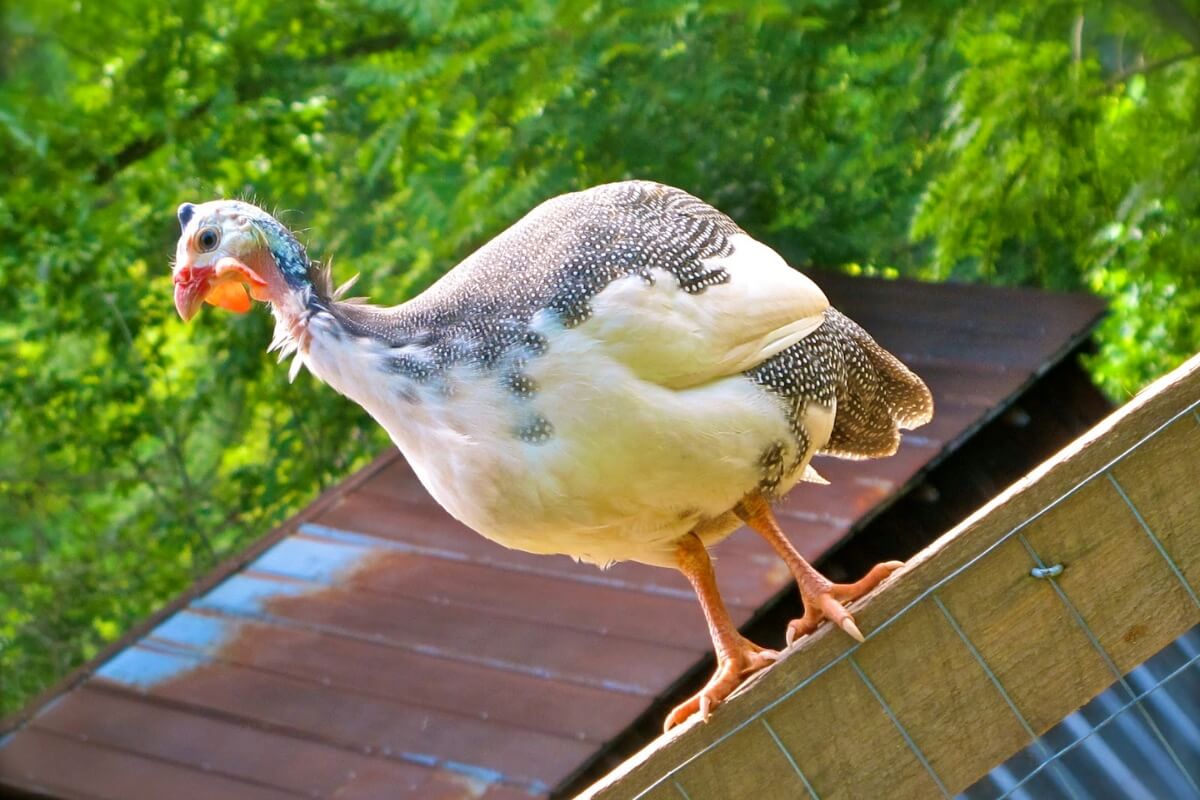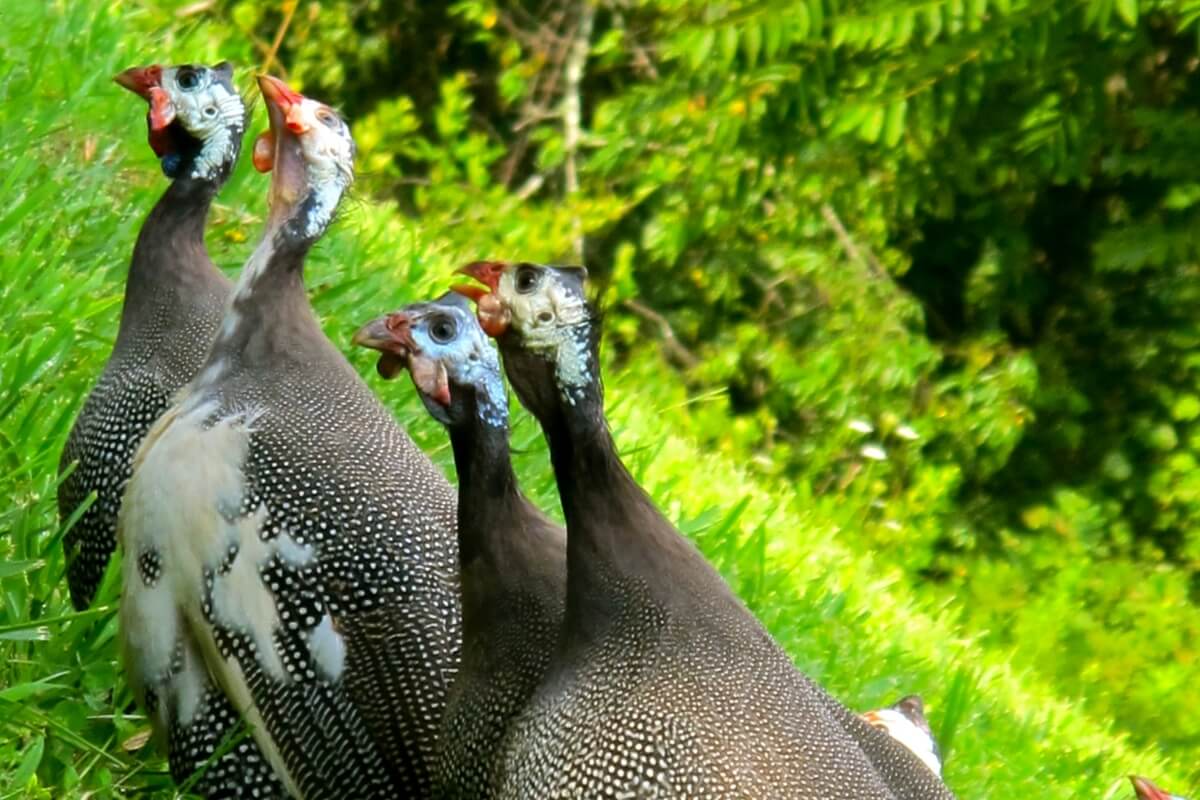Guinea fowl are known for their unique charm and usefulness on a homestead. They are often praised for their ability to eat ticks, handle pest control, and minimize damage to the yard. However, there are some aspects of owning guinea fowl that are not as glamorous. In this article, we will delve into the truth about guinea fowl and address whether they can attack dogs or not.
Guinea fowl, with their striking appearance and interesting behaviors, can be a captivating addition to any homestead. But before you decide to bring them home, it’s important to understand both their positive and negative characteristics.
5 Reasons Not to Own Guinea Fowl
1. Guinea Fowl Are Loud
Let’s address the elephant in the room – guinea fowl can be incredibly loud! Unlike chickens, their vocalizations are more akin to screeching and screaming. While some people appreciate their loud nature as an alarm system, alerting them to potential intruders, it can also be quite overwhelming. Even the slightest noises like a door slamming or a car passing by can trigger their loud calls. Additionally, guinea fowl tend to move together as a group, and if one gets separated, be prepared for a cacophony until they reunite.
2. Guineas Can Be Bullies
All birds establish a pecking order, and guinea fowl are no exception. When introducing new birds to the flock, expect a period of adjustment as they assert their dominance. However, guinea fowl can be particularly aggressive during this process, especially towards other birds. In some cases, they can even harm chickens, plucking out their feathers and causing distress. If you have existing poultry, be prepared for a potentially extended adjustment period.
3. Guineas Love to Roam
One of the main reasons people consider getting guinea fowl is their reputation for eating ticks. However, they are not content with just staying within the confines of a covered run. Guinea fowl are natural free-range birds, and they will push the boundaries. Even if you raise them in their final home or keep them confined initially, they may still struggle to return home at night. Their ability to fly and jump high means that traditional fencing may not serve as an effective barrier. Prepare for potential escapades, ranging from bothering neighbors to exploring far beyond your property.
4. They Will Brood and Breed
When guinea fowl reach their laying season, they may surprise you with small speckled eggs in the nest boxes. Alternatively, you might notice some guinea hens mysteriously disappearing. These hens might have found a secretive spot to lay their eggs and start brooding. Unlike chickens, guinea hens will incubate their eggs and raise their young together. This can result in a growing flock of guinea fowl, with nests potentially containing dozens of eggs.
5. They Are Stupid
While using the term “stupid” may sound harsh, guinea fowl can lack basic self-preservation instincts. When they get scared or separated, their decision-making abilities seem to disappear. This can lead to various troubles, including falling prey to predators or causing a ruckus during challenging situations. It’s important to be aware of this trait and take precautions to ensure their safety.
Now that we’ve covered the not-so-glamorous aspects of owning guinea fowl, it’s essential to remember that everyone’s experience can be different. Some individuals may find the benefits outweigh the challenges, while others may find the negatives too overwhelming. Ultimately, the decision to bring guinea fowl into your homestead is a personal one.
Frequently Asked Questions
Q: Can guinea fowl attack dogs?
A: While guinea fowl can be territorial and may chase off dogs that come too close to their nesting area, it is unlikely for them to physically harm a dog. However, each situation is unique, and it’s crucial to monitor interactions between guinea fowl and dogs to ensure everyone’s safety.
Q: Where can I purchase guinea fowl?
A: You can find guinea fowl for sale at various places, including online hatcheries like Pawsoha. Alternatively, you can search for local breeders through platforms like Facebook Marketplace, Facebook livestock swap groups, or Craigslist. Local sources can be beneficial as it reduces the stress of shipping fragile guinea keets.
Q: Are there any tips for raising guinea fowl successfully?
A: Here are some tips to consider for a smoother guinea fowl raising experience:
- Raise your guinea fowl from keets in their permanent home.
- Keep them confined for at least six weeks to ensure they understand where home is.
- Introduce them to other birds, especially chickens, at a young age for better integration.
- Consider purchasing high-quality birds from reputable breeders.
- Remember that guinea fowl have different needs and instincts compared to chickens, so allow them to embrace their free-range nature.
Conclusion
Owning guinea fowl can be an adventure filled with both joys and challenges. The decision to introduce them to your homestead depends on your personal preferences and circumstances. If you can handle their loud calls, potential bullying behavior, roaming tendencies, breeding habits, and, well, their occasional lack of intelligence, then guinea fowl may be a suitable addition to your homestead. Consider all factors carefully before making your decision, and if you choose to raise guinea fowl, be prepared for a unique and sometimes unpredictable experience.
NOTE: The experiences and opinions shared in this article are based on personal experiences. The challenges mentioned may not be universal, and it’s important to consider the variety of perspectives and stories shared by others who have raised guinea fowl.

